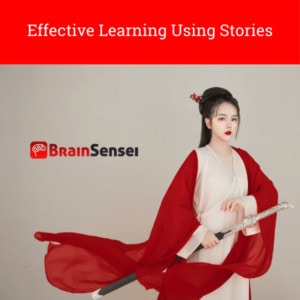

 Do you ever wonder why many of the best teachers tell stories?
Do you ever wonder why many of the best teachers tell stories?
Think back to your school days where a math question was presented in the form of a short scenario. Do you remember how Sally had 10 watermelons and gave 5 to Jerry, leaving her with only 5 watermelons for herself, wondering why she might have done that or what was going on with Sally and Jerry?
Or learning about the life cycle of a frog by following a tadpole named Fred on his growth into an adult frog and even to this day, hoping that Fred or his progeny are living a long and happy life. Think back to all the times you’ve had to learn anything new. How was the information presented to you?
Storytelling and Memory
You’ll find that frequently, professional instructors, especially the good ones, will present information through storytelling and memorable personal experiences. The data that they want you to learn is hidden in those stories and anecdotes, making it easier for you to absorb and retain.
This isn’t a coincidence! There have been studies to understand how we retain information. In the 1990’s, an Italian Neurophysiologist (a psychologist who tries to understand the relationship between our physical brains and our behaviour (Neuropsychologist, n.d.) did an experiment involving Macaque monkeys and their brains (Winerman, 2005, p. 48). They wanted to see which parts of the monkey’s brains were reacting when the monkey did certain activities.
During the experiment, one of the scientists reached for their lunch. The monitor with the monkey’s brain waves lit up. Without looking at the monkey, it seemed like the monkey was reaching for the food. But the monkey was only observing someone else reach for the food (Winerman, 2005, p.48).
Brain Activation
What that experiment showed was mirror neurons (Winerman, 2005, p.48). In other words, when we observe somebody doing something, our brains react like we’re the ones doing the action even if we’re just watching. How does this translate to learning through stories? Well through further research, done by Princeton University, it’s been found that when someone is listening to a story, the same parts of the brain being activated in the speaker were also activated in the listener.
This means the listener is actively reacting to what is being told to them as if they’re the ones who are experiencing the events in the story (Patel, 2011).
Emotional Connection
What does this mean? Well, by having the information presented in the form of a story, it allows you to emotionally connect with the data being presented, helping you relate it to something that’s relevant to your life (Yehuda, 2018). It’s easier for you to relate to the context being given to you, than for you to try to create context around a bunch of dry facts (Kopett & Richter, 2000).
Within the stories being told, recognizable roles can be found, making it easier for you to relate to similar situations that you’ve seen and absorb it into your short-term memory (Kopett & Richter, 2000). With repetition and practice, you store that data into your long-term memory and create a habit for retrieval when you need the information. No matter how old you are or what you’re trying to remember, keep in mind that telling it in the context of a story might help you better remember the key concepts!
Prepare for the CAPM and PMP Exam
If you want an interactive and memorable way to get through your PMP studies, check out Brain Sensei’s PMP or CAPM Exam Prep courses! Besides having all that you need to pass the PMP exam (like 900+ practice questions), their interactive storyline will help you better retain the key concepts, not to mention, it’s way more fun. Learn more at brainsensei.com
Brain Sensei’s Complete PMP Exam Prep course
Brain Sensei’s Complete CAPM Exam Prep course
Written by: Carmen Chung
References
Koppett, K., & Richter, M. (2000, October 9). How to increase retention through storytelling. [Web Blog Post].
Neuropsychologist. (n.d.). Retrieved from https://www.healthline.com/health/neuropsychologist
Patel, U. (2011, Dec 5). Hasson brings real life into the lab to examine cognitive processing.
Winerman, L. (2005, October). The mind’s mirror. Monitor on Psychology, 36, 48.
Yehuda, R. B. (2018, April 15). From Neurons to Narratives: How Stories increase attention, retention, and engagement. [Web Blog Post].
Sign-up for a 7-day free trial! Try the first two modules of Brain Sensei’s story-based PMP and CAPM Exam Prep courses and a mini practice exam and see how it all works
Conclusion
In the realm of effective learning, storytelling reigns supreme. Brain Sensei’s unique approach to project management education demonstrates the power of storytelling to engage learners and improve knowledge retention. By immersing learners in captivating narratives, Brain Sensei fosters a deep understanding of project management concepts and empowers individuals to apply their knowledge in real-world scenarios. Embrace the future of learning by embracing the power of storytelling.
Have you led projects and are looking to earn a project management certification? You might be interested in learning about how lucrative this can be. Check out these articles.
13 PMP Benefits Once You Get The PMP Certification
No experience leading projects but still want to get into project management? No problem! Check out these articles.
CAPM Certification Eligibility
What is a Certified Project Manager; How do I get PM Certifications

 Do you ever wonder why many of the best teachers tell stories?
Do you ever wonder why many of the best teachers tell stories?